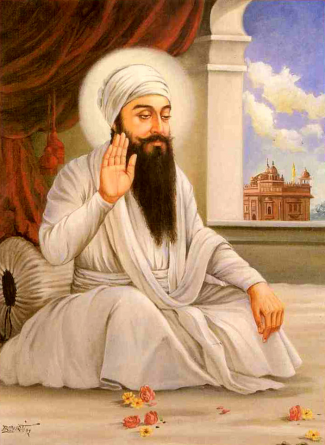Guru Arjan Dev, the fifth of the Sikh Gurus, became the first martyr in the history of Sikhism. He attained the status of shaheed as one who sacrificed his life for the sake of his faith at the hands of the Islamic Mughal Empire. When ordered to change certain passages of scripture which offended Mughal rulers, he refused. His unwillingness to comply resulted in his being arrested and tortured to death during the hottest part of the year.
5 Key character, Their Roles, and Factors in the Martyrdom of Fifth Guru Arjan Dev
History is filled with discrepancies regarding the Firth Gurus martyrdom. However, according to excerpts of the personal diary of Emperor Jahangir and a letter posted by Jesuit Father Jerome Xavier from Lahore dated September 25, 1606 make it clear that events and factors pertaining to Guru Arjan Dev’s martyrdom point to five key characters.
Prithi Chand: Elder brother of Guru Arjan Dev, Prithi Chand hoped to succeed his father Fourth Guru Raam Daas as guru. Instead Prithi Chand had been banished by his father for lying, stealing, subterfuge, and intercepting mail intended for the Guru from his younger brother Arjan. Prithi Chand also hatched several plans to prevent Arjan Dev from having an heir. When his attempts failed, he turned towards the Mughal court hoping to curry favor with the emperor. Filing a complaint with the revenue officer of Lahore, Prithi Chand stated that as his father’s eldest son he should have inherited his father’s property. Guru Arjan Dev turned over the holdings to his brother and brought him back to court. However, his rivalry never ceased. Prithi Chand continued unwaveringly to plot mischief against his brother in the Mughal court, and informed Emperor Jahangir about scripture referencing the Musalman.
Chandu Shah: An officer of high rank in Lahore, Chandu Shah desired a match for his marriageable daughter. Upon hearing a suggestion that Arjan Dev, the younger son of fourth Guru Raam Dass would be a prospective candidate, Chandu had rudely implied that the Guru lived dishonorably on the offerings of his devotees and likened marriage between his daughter and the guru's son to the fixing of ornamental roof tiles to a gutter. Chandu's wife however approved, so Chandu proposed the match. However, the Guru had heard about Chandu’s offensive comments and firmly declined the proposal. Chandu resented the Guru’s refusal and considered it to be a personal insult, and thereafter viewed the Gurus as his enemy. He used his considerable influence in the Mughal court to his express his animosity and took every advantage to speak ill of Guru Arjun Dev. When the opportunity arose, he directly took part in the week-long merciless torture and martyrdom of the fifth guru.
Khusrau Mirza: The eldest son of Prince Nur-ud-din Mohammad Salim, and grandson of Mughal Emperor Akbar. Khusrau had hoped to succeed his grandfather in place of his father Prince Salim, a fanatic tyrant who under the official title Emperor Jahangir indulged excessively in wine and opium. A moderate loved by the court, and favored by his grandfather Akbar to succeed him, Khusrau openly opposed his father, and raised a rebellion with an aim to take the throne. The resistance however failed, and Jahangir imprisoned Khusrau. Expressing his desire to visit his grandfather's tomb, Khusrau planned an escape. Jahangir received unsubstantiated reports that Guru Arjun Dev had given shelter to the rebel, had provided Khusrau with food, supplies, and substantial sums of money, and then blessed the usurper by placing a spiritual tilak mark on his forehead representative of royalty. Supposed association between the dissident and the guru fueled Jahangir’s resentment which ultimately led to the guru's incarceration.
Mughal Emperor Jahangir: (Prince Salim) fanatic Islamic successor of Emperor Akbar, resented the growing popularity of Guru Arjun Dev, and begrudged his success at propagating the Sikh faith. Spurred by the vengeful plotting of Prithi Chand, and bitterness of Chandu Shah, along with reports that the Guru had supported the rebel Khusrau Mirza. Angered, Emperor Jahangir had Guru Arjun Dev arrested and brought before him. The emperor raised questions about certain texts of scripture that Guru Arjan had compiled in the Adi Granth, and demanded that he change the wording of a particular line originally written by Guru Nanak which addressed the issue of disposing the remains of dead by burial in the ground, or burning at the crematory:
"Mittee Musalmaan kee paerrhai paee kumhiaar ||
The mud within the Muslim's grave becomes the potter's clay.Gharrh bhandae ittaa keeaa jaldee karse pukaar ||
Pots fashioned and bricks made from it cry out as they burn.Jal jal rovai bapurrhee jharrh jharrh paaveh angiaaar||
The poor clay burns, and burning weeps, as fiery coals continuously fall upon it.Naanak jin kartai kaarann keeaa so jaannai kartaar ||2||
Nanak, God, the Creator who created creation, alone knows, whether it is better to burn or bury." ||2|| SGGS||466
Emperor Jahangir argued and urged that the word Musalman be changed to the word be-diaan meaning "dishonest". Despite an attempt to intercede on his behalf by the Muslim saint Pir Mian Mir, who recommended a small fine along with removal of offending text, Guru Arjun refused, unwilling to change even a single word of scripture to please the emperor. Displeased, and angered, Jahangir wrote a nonspecific order that the guru be punished, and handed him over to the jailer.
Murtaza Khan: The jailer received a nondescript order which he took it to mean that he might freely punish Fifth Guru Arjan Dev. Murtaza Khan ordered confiscation of the Guru's goods and properties as the payment of Jizia, a tax levied on non-Muslims in lieu of conversion, or death. Guru Arjan Dev refused payment and ordered Sikhs, who had begun to raise funds on his behalf, to pay nothing. The ever-vindictive Chandu Shah saw his opportunity, and used his influence with Murtaza Khan to take charge.
So began a rigorous five days of torture
Guru Arjun Dev Shaheed and Joti Jot (Martyrdom and Death)
Shaheed is a term that signifies martyrdom and refers to the supreme sacrifice of a soul in a spiritual testimony of faith. A shaheedi is one who as attained or achieved martyrdom specifically at the hand of a Muslim.
Joti jot signifies death in the sense of light merging into divine light and refers to the radiance of a soul merging with the supreme light of God.
The order for his arrest prompted Fifth Guru Arjan Dev to appoint his son Har Govind to succeed him as sixth guru of the Sikhs. Detained in Lahore at the hottest time of year, the Mughals subjected Guru Arjan Dev to relentless torture.
Day 1: On his first day of captivity, the fifth guru's captors did not permit him to eat any food. They refused to allow him to drink even water. They also denied him sleep.
Day 2: On the second day, his captors immersed the guru's body into a cauldron of water over a flame, and brought it to a boil until it raised blisters on his flesh.
Day 3: On the third day, in order to inflict further torture, his tormentors poured burning hot sand over his body searing his scalded skin.
Day 4: On the fourth day, his persecutors forced the guru to sit with scorched skin upon an enormous iron plate roasting over red hot coals.
Day 5: On the fifth day, hoping to further plague the guru's ravished body with agonizingly icy cold water, his harassers led him into the nearby River Ravi. Guru Arjun Dev left the shore and stepped into the river where he dipped below the surface to assuage his wounds and disappeared forever after from sight. His persecutors never recovered the guru's body.
Fifth Guru Arjun Dev Ji became shaheed and attained martyrdom, departing his earthly body at Goindwal on the fourth day of the waxing moon in the month of Jeth in the Bikram Savant year 1663, or May 30, 1606 of the Julian Calendar, and June 16, 1606 A.D. of the modern-day Gregorian and Nanakshahi calendars.
Historian's records indicate that the Fifth Guru Arjun Dev Ji never succumbed to his captor's demands, nor did he give his tormentors any satisfaction, as he never cried out from pain. Guru ji remained immersed in silent contemplation and only gave praise to the sweetness of divine will. Guru Arjun Dev is remembered as an outstanding example of the exalted spirit known to Sikhs as "Chardi Kalaa".







